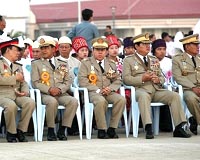| . |  |
. |
Buffalo NY (SPX) May 03, 2010 A study by communication researchers at the University at Buffalo confirms what was made evident by the very public Google-Chinese government dispute over Internet censorship: the fact that China's cyberculture is changing and growing rapidly is no harbinger of political freedom and open speech in that country. "Discourse Behind the Forbidden Realm: Internet surveillance and its implications on China's blogosphere" was published in the most recent volume of the journal Telematics and Informatics (Volume 27, Issue 1), by noted communication researcher Junhao Hong, PhD, UB professor of communication, whose current research involves the Google/China clash. His co-author is UB doctoral student Shaojung Sharon Wang. The study responds to claims that widespread use of blogs threatens Chinese government control over democratic discourse, free speech and civil rights in China's traditionally closed society. "Some hold that advanced technology and the free flow of information make the Internet uncontrollable," Hong says, "but there has apparently been no diminution in Chinese government surveillance, and Internet censorship could continue to be one of the most pervasive barriers to regime change." It is widely acknowledged that Internet regulation (or repression) is more extensive and advanced in China than in any other nation. The government employs a broad range of laws and regulations to block website content and monitor access of individuals to the Internet. It expects branches of state-owned ISPS, organizations and international companies, including Yahoo, Google and Microsoft, to implement these measures. Hong and Wang acknowledge that "the rapidly transforming blogosphere could be a catalyst for social change and organized political discourse." However, they add that the battle between the Chinese authoritarian government, which wants censorship and supremacy, and Internet activists seeking to overcome governmental control, will continue for the foreseeable future. Furthermore, Hong says, "Although the change in China's cyberculture is, like all change, inherently contagious and continuous, it is not likely to overcome government regulations that intimidate users." One reason for this, he says, is that China's blog regulations require the registration of all noncommercial and personal websites and blogs. This demonstrates that while China encourages economic openness, it maintains strict control over politics and dissent. Hong points out that blog service providers, which have bloggers' real names, addresses, phone numbers and e-mail addresses, are required by the government to monitor content and delete illegal and "bad" information in a timely manner or terminate service to the offending blogger. "This arrangement, made official in a 2007 pact signed by at least 20 major blog service providers including Yahoo Inc. and Microsoft Corp.," Hong says, "is enough in itself to quell online political dissent." He points out that the Internet itself implements technological architectures that mine information about human behavior and preferences. That information is fed back to those overseeing cyberspace activities, making their oversight much easier. "It is the very openness of the Internet that permits the tracing of every online activity. So government monitoring of the system has a great impact on the Chinese population and provokes strong fear of arrest and imprisonment," Hong says. "The effect of this social surveillance is the depoliticization of communication by self-censorship," he says, "meaning that at this point China's blogosphere, in and of itself, has limited value as a medium for free speech, even for the one percent of the population that blogs. Few Chinese bloggers discuss 'pure' politics online. Instead, as in the West, they concentrate on celebrity gossip and self disclosure." The authors acknowledge that the Chinese government's ability to impose Internet censorship is limited, but say its ability to conduct Internet monitoring is not. "Since the openness of the Internet allows the tracing of every online activity," Hong says, "fear of arrest and imprisonment ensures that the impact of that monitoring is likely to be strong. So at the moment, at least, the Internet is not a real threat to authoritarian regimes." In fact, Hong and Wang conclude that the growth of the Chinese blogosphere - from 230,000 to 16 million in only six years - facilitates surveillance of the kind used by the Chinese government to control free expression.
Share This Article With Planet Earth
Related Links University at Buffalo Democracy in the 21st century at TerraDaily.com
 Myanmar generals resign ahead of elections
Myanmar generals resign ahead of electionsYangon, Myanmar (UPI) Apr 28, 2010 Myanmar's prime minister is among several senior military leaders who have stepped down to run in national elections this year. Prime Minister Lt. Gen. Thein Sein will run as a civilian in Myanmar's first elections in 20 years. Although a date for polling hasn't been set, October is thought to be the month. There has been no official announcement about the resignations, numbering ... read more |
|
| The content herein, unless otherwise known to be public domain, are Copyright 1995-2010 - SpaceDaily. AFP and UPI Wire Stories are copyright Agence France-Presse and United Press International. ESA Portal Reports are copyright European Space Agency. All NASA sourced material is public domain. Additional copyrights may apply in whole or part to other bona fide parties. Advertising does not imply endorsement,agreement or approval of any opinions, statements or information provided by SpaceDaily on any Web page published or hosted by SpaceDaily. Privacy Statement |